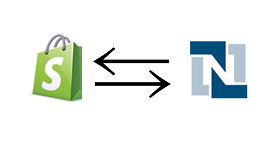Are you selling your products through multiple channels? Is your Shopify web store and back-end ERP in sync? Can you make changes to your products and inventory from your ERP have them sync over to your web store in real-time?
Even if your answers to the above questions are NO, there’s no need to worry as most online sellers are facing this very problem. As Shopify Connector integration experts, we can guide you as to why and how you can connect your Shopify based web store to the NetSuite ERP.
Shopify and NetSuite – Why They Should Work in Tandem
The primary focus of your back office ERP is to keep your books balanced and clean while your front end web store is the touch point for sales and order placement, etc. But what happens when there’s an inconsistency between the sales order taken on your web store and the invoice generated in your NetSuite back office, or if the customer wants to update their sales order after it was placed through the web store, or if your sales staff took some some orders over the phone and entered them directly into NetSuite, and you now want to sync those with your web store, what do you do then?
As an online retailer, you’re going to face issues like these on daily basis, and they will definitely divert your time and focus away from sales, which may lead to you not being able to meet your sales goals. But if these two systems are integrated and fully automated, then you’ll be able to focus your attention fully on maximizing rather than worrying about problems like these. Furthermore, by integrating these two systems you’ll get the added benefit of timely fulfillment and subsequently customer satisfaction.
Aside from the these two obvious benefits, there’s a number of other advantages that an automated integration solution between NetSuite Shopify provides. Like real time inventory being reflected on your web store, so people know what’s in stock and which items are available as back orders. This also enables interested buyers to subscribe for notifications as soon their item becomes available, so you don’t lose their business. Not only does real time inventory therefore help boost sales, it also provides a better customer experience to your users.
And considering the multitude of online stores that these customer can turn to instead of yours, it is absolutely vital that you provide a high quality shopping experience. Because what online shoppers look for most is a retailer that they can trust, one that provides a smooth customer experience and quick delivery. By using an automated integration solution you can also keep a historic record of your customer’s purchases so you can customize their shopping based on their interests and past purchases, which not only gives you a chance at up-selling and cross-selling, but also makes your customers feel special.
Given the advantages, an automated integration solution NetSuite Shopify is absolutely essential if you want to remain competitive in the ecommerce business.
I’m convinced; tell me how to integrate NetSuite Shopify
So what are the best possible approaches for connecting your Shopify web store to NetSuite. Well, you have three options:
- Use Point-to-point connectors
- A custom developed integration OR
- Middle ware based integration solutions
Point-to-Point Connectors
This first option is to use a Point-to-Point connector. Point-to-point basically means that NetSuite Shopify are “pointed” at each other to synchronize data; there’s no operational platform in the middle. So you’ll have to choose which system to want to manage your data in.
Point-to-point connectors are usually available at reasonable yearly or half yearly pricing models. By using this type of connector or integration, you’ll have the flexibility to fully customize either side the of the integration exactly according to your needs.
Keeping these benefits and the underlying benefits in mind, Folio3 has developed a Point to Point NetSuite Connectors which can be completely customized according to your specific requirements and business flows.
Custom NetSuite Shopify Integration
The other option you can use for integrating Shopify and NetSuite is a custom built NetSuite Shopify integration. Generally though, this option is only viable if you’re a developer yourself. Since most businesses don’t have the time to learn Shopify and NetSuite APIs (application programming interface) and write business process flows on your own, nor the resources to have a team of developers build such an integration from scratch.
Middleware based NetSuite Shopify integration solutions
This is third option for integrating Shopify to NetSuite. This method basically involves a middle ware server which resides between Shopify and NetSuite. The use of such a multi-channel integration platform is more affordable than a full-custom built integration. However, this type of integration is basically a generic implementation between the two systems and as such, may not fulfill your business’ specific requirements. The only solution in that case, is to customize the integration to cater to the missing requirements. But if you want customization done, the vendor will certainly charge you for that particular requirement, and by the end, you’ll end up spending the same cost you were trying to avoid in the Point-to-Point connector.
Wrapping-up
In short, using a Point-to-Point connector is probably the best and least costly method for integrating NetSuite and your Shopify based web store.
